Even a keen connoisseur of London might not have been to Rotherhithe, a corner of the River Thames which is somehow remote and central all at once. Far from boasting plenty of attractions and things to do, its streets reservedly offer unique gems to the visitor willing to discover. They reflect hundreds of years of maritime history and an active local community trying to adapt to the major changes this area has undergone in the past decades.
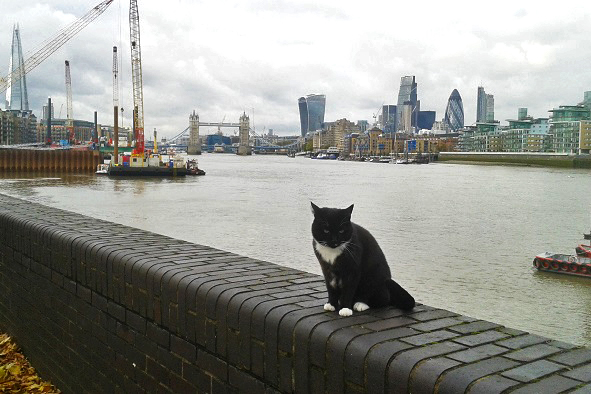
The view from Bermondsey Wall, the western part of Rotherhithe (Photo: Andrea Gambaro)
Coming east from Central London, a riverside walk along the south bank normally ends at Tower Bridge, as the crowd either turns back or heads towards the north bank. Instead, those who dare keep walking enter the historic area of Rotherhithe, where time seems to have slowed down. From the banks where Gulliver sailed off on his travels, the city looks unusually quiet and much further away than it actually is. But don’t settle for the postcard view, as other gems are hidden among the cobbled streets of this little-known peninsula.
Rotherhithe – a Saxon name meaning “mariners’ landing place” – was once shaped by docks and busy with all sorts of maritime activities, including the scurvy rogueries of pirates and smugglers. Largely destroyed during World War II, the docks lost their importance in the following decades, and most of them were replaced with housing during the 1980s. However, what is today a residential area still preserves the heritage of its past, of which a royal residence, the pub where the Mayflower was moored and an underwater engineering marvel are just a few examples.
Restaurants
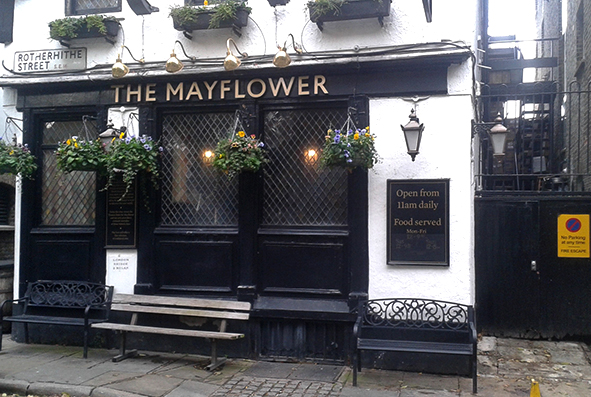
The entrance of The Mayflower (Photo: Andrea Gambaro)
The Mayflower (117 Rotherhithe Street) is where the Pilgrim Fathers’ ship was moored before setting sail for The New World in 1620 (it’s rumoured that Captain Christopher Jones, buried across the street at St. Mary’s church, chose this spot to avoid paying mooring taxes). Originally built around 1550 as The Shippe, The Mayflower is the only pub in the United Kingdom licensed to sell both US and UK postage stamps. However, stopping by only for a stamp would be careless to say the least. The wooden deck over the river, the cosy old-school pub and the upstairs lounge provide countless excuses to linger over one of the guest ales or a glass of wine. The fame of the gastro-pub menu reaches beyond the borders of Rotherhithe, offering British and European-fusion style dishes, with some ingredients sourced locally at the Surrey Docks Farm (see below). Keep an eye on the specials board.
Well off the beaten track, most places in Rotherhithe village are not likely to be chanced upon, and the Simplicity (1 Tunnel Road) is no exception. The culinary experience at this small restaurant, located between Rotherhithe Station and the Brunel Museum, is well described by its name. The seasonal menu proposes simple yet refined recipes of British cuisine, both in their classic and revised form. The kitchen is open in the evening throughout the whole week, whereas the daytime menu is available only on weekends.
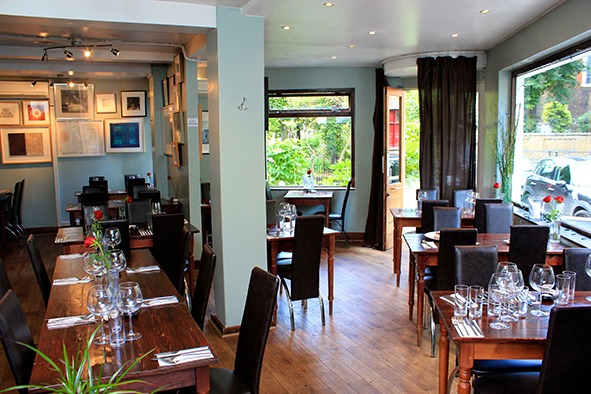
The Simplicty is perfect for couples and small groups (Photo: Simplicity)
Before or after a walk in Southwark Park, Deli Felice (40 Albion Street) is the place to go for a quick meal. The menu offers basic Italian-style dishes and a variety of sandwiches filled with meat, cheese and seasonal vegetables. As a family run business, at Deli Felice they pride themselves on providing authentic Italian products. “We do not serve pre-packed or readymade fast food,” they warn, “so you might have to wait a little longer for a truly tastier and fresher meal”. Additionally, this place promotes local artists by selling their work and hosting temporary exhibitions.
Pubs
Some old pictures of Bermondsey Wall East show a messy row of buildings clumped together, as if elbowing their way to the riverfront. With a history dating back to at least the 17th century, The Angel (101 Bermondsey Wall E) stands as the last reminder of those good old times. Nostalgia aside, the open space outside the pub occasionally serves as an impromptu terrace for sunbathing, in front of the ruins of Edward III’s mansion. Inside, thanks to a recent renovation, the elegant and welcoming atmosphere is perfect for relaxing over one of the Samuel Smith’s beers. A best case scenario: the narrow wooden balcony is not too busy, Tower Bridge is illuminated by the sunset, the flows of the tide are high enough to barely disturb the chatter and the beer head is just as thick as it should be. Amen.

A statue outside The Angel of Alfred Salter: medical practitioner and politician (Photo: Andrea Gambaro)
At The Salt Quay (163 Rotherhithe Street) a big red bascule bridge marks the entrance from the Thames into what remains of the Grand Surrey Canal. Across two floors, this spacious pub offers a good selection of beers, a large wine list and a classic pub food menu. Even in wintertime the beer garden is hard to resist, surrounded by water on two sides. Many local residents still know this pub by the old name – The Spice Island – and they swear there’s no better way to enjoy a Sunday roast on a sunny day.
The Winnicot (94 Bermondsey Wall East) was formerly known as The Old Justice. Back then, writing on the wall said this building used to be a prison for pirates and outlaws awaiting death sentence, their next destination being the Execution Dock on the other bank of the river. Here they would be hung and left at the mercy of the Thames’ tide, as a warning. Legend has it that their torments still haunt the rooms of the pub. As much as the fainthearted might advise against hanging around late, the Winnicot has the most benevolent opening times in the area, winning hands down the nomination as last stop on a riverside pub-crawl. When it’s too early for ghost tales, the pizza made by the Italian chef is arguably the best in Rotherhithe, and also comes in the rustic version ‘pizzetta montanara’ (an appetizing little fried pizza).
Shops
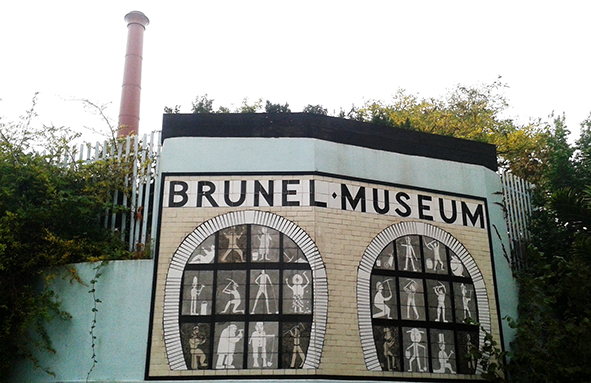
The entrance of the Brunel Museum (Photo: Andrea Gambaro)
In 1825 Marc and Isambard Brunel started the construction of the first known tunnel underneath a navigable river, a pioneering feat that earned the status of ‘eighth wonder of the world’ at the time. In addition to a selection of books documenting that enterprise, The Brunel Museum Bookshop (Railway Avenue) displays antique print reproductions and other souvenirs related to the tunnel. The project was completed in 1843, despite several floodings and appalling working conditions for the miners. It couldn’t initially be used for freight, as originally intended, for financial reasons. Instead, it opened as a tourist attraction, becoming an underwater site for fairs, shows, banquets, and even night-time louche activities. Today the Grand Entrance Hall of the tunnel revives that period (not the louche bit) by hosting music and theatre performances in its suggestive atmosphere.
Up Market (48 Albion Street) is currently the only charity shop registered in Rotherhithe. It was opened in 2011 by a group of local representatives, contrasting the closure of many local shops overwhelmed by the modern Surrey Quays Shopping Centre. Deeply committed to the local community (its motto being ‘from the community, for the community’), Up Market has a loyal customer base. The shelves mainly display second-hand clothing for ladies, men and children, in addition to accessories, bric a brac, artwork, china, vinyl, DVDs and books.
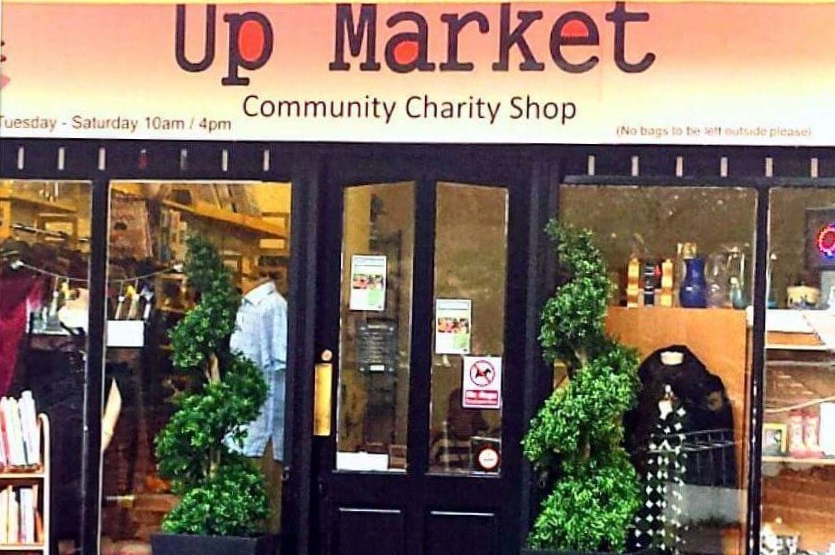
The Community Charity Shop of Rotherhithe (Photo: Up Market)
Throughout the year Rotherhithe regularly hosts Scandinavian events, such as the Christmas Scandimarket (late November) and the Norwegian Constitution Day (17th of May). The Nordic community is indeed rooted in the area, as demonstrated by a few seamen’s churches located around here. The Finnish Church Shop (33 Albion Street), displaying gift items and traditional delicacies, is a meeting place where visitors can find out about activities and events organised by the community. Next to it, a café offers a selection of Finnish specialties, including cinnamon buns and Karelian pies, and provides a taste of authentic home cooking during the weekend (only by order). The church also hosts a Finnish sauna in its basement.
Outdoors
In a few years a futuristic pedestrian and cycle bridge might connect the eastern part of Rotherhithe to Canary Wharf. Although some locals might have to give up some of their blessed isolation, the Surrey Docks Farm (Rotherhithe Street) would certainly gain more visibility. Livestock, crop plants, the Piccalilli Caff (see below) and even a working forge make this farm a reference point for the local community; a taste of rural life in dramatic contrast with the hyper-modern business district on the other side of that future bridge. Visits are free (a donation is suggested) every day until 5pm, whereas other activities such as cooking, crafting and natural dyeing workshops are subject to an admission charge and must be booked in advance.
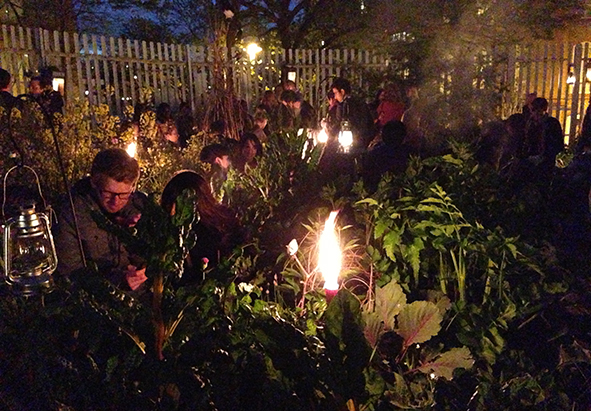
A winter Midnight Apothecary on the roof of the Brunel Museum (Photo: Midnight Apothecary)
The Midnight Apothecary (Railway Avenue) has all it takes for a successful campfire, including toasted marshmallows, torches and carols. However, the real heroes of these intimate gatherings are the botanic cocktails wisely mixed by The Cocktail Gardener, a modern-day witch Circe who draws on botanical knowledge to tease her guests. After redeveloping the Brunel Museum roof garden and turning it into a community potager, she decided to use her skills to service mixology, much to the rejoicing of those who have tried this temporary refuge from urban chaos. The Midnight Apothecary has been widely celebrated since it started in 2012, but it still remains a little gem to be discovered among the soft street light of Rotherhithe. It takes place every weekend in summer and on sporadic occasions during the rest of the year (roughly once a month).
In the heart of the Rotherhithe peninsula, the Russia Dock Woodland Park (entrance on Redriff Road) is a former dock filled in during the 1980s and redeveloped with water channels, ponds and native vegetation. In addition to the rich flora and wildlife, the park still contains remaining signs of the old docks, such as retaining wall capstones and mooring chains. An active group of residents, the Friends of Russia Dock Woodland, helps take care of the local ecology, and everyone is welcome to join their outdoor activities on Wednesday mornings and on the second Saturday of every month.
Cafes
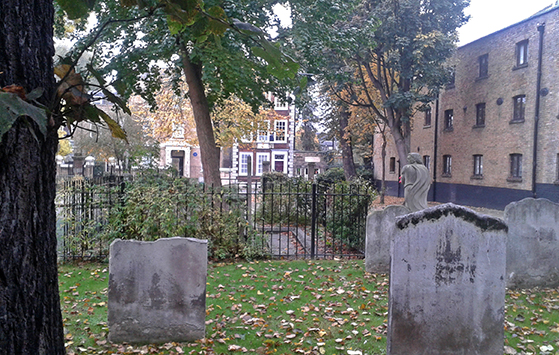
Christopher Jones’s grave, Captain of the Mayflower, seen from The Watchhouse (Photo: Andrea Gambaro)
A stone plaque above the Watchhouse Café (St Marychurch Street) reminds folk of its original function: a neighbourhood watch part of St Mary’s Parish, established in 1821. The location, looking out over the churchyard, was particularly good to guard against body snatching, a very lucrative activity at that time. Today this tiny building is extremely well preserved and hosts a lovely café, largely appreciated in the area. The inside is too small to allow much seating, but the tables in the back garden make up for it. The only trait of this place to have been lost in time is the attitude of those who run it, as the cordial and neighbourly manners of the staff wouldn’t quite suit the onetime wary, suspicious watchmen.
Opened in 2014 by a young couple, the Piccalilli Caff (Rotherhithe Street) immediately fit in with the community of the Surrey Docks Farm, where it is located. Craig and Scarlett source their ingredients locally, if not directly at the farm, and serve traditional breakfasts and hot drinks. But what the café is mostly known for are the delicious cakes, available both by the slice and to take away for home parties. The Piccalilli also caters for the events that take place at the farm, and offers bespoke menus for any occasion, including children’s parties.
The Canada Water Café (40 Surrey Quays Road) catches the passersby’s eye with its colourful outside tables. Located in the busiest and most modern spot of the area, the café is mostly popular among tube commuters and workers from the nearby offices. However, the friendly staff and a relaxed atmosphere invite the customer to stay longer than a quick office break, be it for breakfast or brunch. Later on in the day the café shows off its true inspiration, serving pizza and other Italian dishes. Open every day until after dinner, this place also has a tempting list of cocktails, which makes it the best option around for an Italian-style aperitivo.